- Home
- J. T. Edson
The Floating Outfit 18
The Floating Outfit 18 Read online
The Ysabel Kid was being followed as he rode the trail back to Rio Hondo County. The three hombres behind him were robbing cowhands of their cattle-drive pay, and the Kid had been deputized to stop them. Riding out on his lonesome, he intended to bring justice to this lawless land. But another gang was also at work in the Texas hills, and they had snatched the granddaughter of Ole Devil Hardin, the Ysabel Kid’s boss and owner of the famed OD Connected ranch, from the local stagecoach. Now the Kid wants more than justice, he wants revenge. His Winchester is at the ready, his bowie knife is sharp and unsheathed, and his eyes are glittering with rage. But he didn’t know a criminal mastermind was behind the kidnapping. And he didn’t know the varmint was no gentleman. It was a lady gone bad....
THE FLOATING OUTFIT 18: TEXAS KIDNAPPERS
By J. T. Edson
First published by Dell Books in 1996
Copyright © 1996, 2017 by J. T. Edson
First Smashwords Edition: December 2017
Names, characters and incidents in this book are fictional, and any resemblance to actual events, locales, organizations, or persons living or dead is purely coincidental.
All rights reserved. No part of this book may be reproduced or transmitted in any form or by any means, electronic or mechanical, including photocopying, recording or by any information or storage and retrieval system, without the written permission of the author, except where permitted by law.
This is a Piccadilly Publishing Book
Series Editor: Ben Bridges
Text © Piccadilly Publishing
Published by Arrangement with the Author’s Agent.
The Home of Great Western Fiction!
CONTENTS
Author's Note
One – It’s Just Like She Said It Would Be
Two – Stop the Man!
Three – My Jewelry. It’s All Gone!
Four – They Must Have Climbed to the Balcony
Five – Don’t Try to Pull That Old Game On Me!
Six – Bad Luck, Countess
Seven – Stick ’Em Up, Gents!
Eight – There’s Something Familiar About the Robbery
Nine – It’s Me, Or the Law
Ten – They’re All Dead!
Eleven – You’re All on Your Lonesome
Twelve – I Can Tell You How You Can Make A Heap More Money
Thirteen – You’re Coming With Us, Miss Hardin
Fourteen – She’ll Know All of Us
Fifteen – She Paid A Hell of A Price For Doing It
Sixteen – Trouble Being, I Won’t Be There
Chapter Seventeen – I’ll Kill Her
Appendix One
Appendix Two
About the Author
Copyright
Author’s Note
Although we originally told all we knew about the events recorded herein as Part Two, “The Quartet,” The Half-Breed, further details have been received from Alvin Dustine “Cap” Fog that allow us to produce the full story behind the kidnapping of Elizabeth “Betty” Hardin.
For the benefit of new readers, but to save our old hands from repetition, we have given a “potted biography” of Belle “the Rebel Spy” Boyd and the Ysabel Kid in the form of Appendixes.
When supplying us with the information from which we produce our books, one of the strictest rules imposed upon us by the present-day members of what we call the “Hardin, Fog and Blaze” clan and the “Counter” family is that we never under any circumstances disclose their true identities or their current whereabouts. Furthermore, we are instructed to always include sufficient inconsistencies to ensure that neither can happen even inadvertently.
We would like to emphasize that the names of people who appear in this volume are those supplied to us by our informants in Texas and any resemblance to those of other people, living or dead, is purely coincidental.
We realize that, in our present “permissive” society, we could use the actual profanities employed by various people in the narrative. However, unlike various other authors, we do not concede that a spurious desire to create “realism” is any excuse for doing so.
As we refuse to pander to the current trendy usage of the metric system, except when referring to the caliber of various firearms that had always been measured in millimeters—i.e., Walther P-38,9mm—we will continue to employ miles, yards, feet, inches, pounds, and ounces when quoting distances and weights.
Lastly, and of the greatest importance, we must stress that the attitudes and speech of the characters are put down as would have been the case at the period of this narrative.
J. T. EDSON
One – It’s Just Like She Said It Would Be
Rising four stories in height, with extensive cellars underneath wherein were situated among other facilities the mechanism for operating the hydraulic elevators allowing all except the uppermost one to be reached without the guests having to climb stairs, there was considerable justification for the claim by the Grand Republic Hotel to be the largest, best-situated, and most luxurious establishment of its kind in Washington, D.C., and up to the standards of the finest in any other country’s major cities.
Being comprised of delicacies from around the world as well as those found only in the United States, the food and beverages were of a first-rate standard of excellence and prepared and served by an exceptionally well-trained staff. The waiters and waitresses in the magnificent main dining area and smaller rooms where meals of a less public nature could be taken were trained to perfection and, like the rest of the domestic personnel, noted for their discretion. Chosen for their size and bearing, being attired in garments of military cut of a kind that had gone out of use except for ceremonial purposes in the United States Army, the doormen could supply information about most matters pertaining to the capital city and its environment, particularly those of a confidential nature such as where various types of diversion or company could be located. It was rumored that the amount each received as gratuities for his services, especially those of the latter variety, made his salary seem a mere pittance.
Furthermore, the services offered for the protection of the guests’ property had often been praised. Those who wished to do so could leave their surplus money and jewelry in a box that could only be opened by two keys. One was for the possession of the owner and the other was held in a locked steel cupboard, which the duty manager alone could open in his permanently occupied office. The precautions taken were considered a matter of the gravest importance by the management.
From the beginning, the Grand Republic had received custom from the wealthiest families in the United States, whether involved in railroads, internal or overseas shipping, mining of precious metals or coal, or the cattle industry, which had brought prosperity back to a Texas left impoverished by supporting the Confederacy in the Civil War and was now starting to do the same in other states. i Furthermore, since its fame had spread worldwide by word of mouth, it was regarded as de rigueur for such foreign dignitaries who did not receive private accommodation in the capital city to stay there. Although many of the latter brought personal servants, for whom quarters of a lower standard were available on the upper of the four floors, albeit not served by the elevator, all levels of the workforce were carefully selected for competence at their duties and honesty.
To ensure that the latter quality was possessed, nobody was hired without a careful check being made upon their antecedents to ensure they would be trustworthy. Furthermore, the management maintained two efficient former peace officers and a female attendant, who was equally conversant with her duties, on the premises at all times in the capacity of what a later generation would call house detectives. Between them, being able to recognize many confidence tricksters, croo
ked gamblers, and other members of the criminal fraternity, they were able to keep such undesirables from operating on the premises. There was another part of their duties that was a most effective deterrent to petty or more serious pilfering on the part of the workforce. Not being offered protection by the restrictions that organizers of labor unions of a later day would refuse to permit, regardless of the justification for them being required, even the desk clerks and other senior members of the staff were compelled to don garments of a uniform nature and indicative of each’s status in the hierarchy of the hotel supplied to them on arriving for duty and, regardless of the position held, should there be cause would have their own clothing and persons searched before they were allowed to leave.
Because of the high standard of security employed at the hotel, it was generally assumed by the management and the city’s law-enforcement agencies that a robbery there was impossible to perpetrate.
However, that theory was soon to be disproved in no uncertain fashion.
What was more, the theft was to be carried out from what—despite having some possibilities for allowing unwanted access—was considered to be the safest part of the whole building.
Serving as a storage area for trunks and other items not required in the rooms by the occupants, the roof of the hotel rose in an inverted V. However, around it was what amounted to a wide balcony allowing maintenance work to be carried out. It was well known that the decorative and protective wooden barrier was only a safety measure during the hours of daylight. Each evening, one of the—although the term had not yet come into usage—security force went up and set free the securing bolts that had kept in a nominally safe condition on being replaced at dawn. Doing so allowed it to turn outward on well-oiled hinges if leaned or otherwise pulled upon, and its weak construction would prevent it from supporting any except the lightest of weights. This precaution was intended to prevent the barrier from being used as a means of descending by a ladder or rope to the rooms below, many being fitted with balconies allowing the occupants to go outside and admire the view of their surroundings, but that might otherwise have permitted an unauthorized entrance.
When deciding to steal the extremely valuable jewelry collection brought from Russia by Countess Olga Simonouski, who rumor claimed had less-than-honorable motives for remaining in Washington instead of accompanying her husband on a hunting expedition west of the Mississippi River, Libby Craddock had been all too aware of the difficulties to be encountered. However, by virtue of her upbringing and being possessed of no scruples or fear of possible danger, she had refused to be deterred by considerations of the risks involved. Putting her highly developed skills as an organizer to use, she had found the means by which an entry to the suite occupied by her intended victim could be achieved. With the Countess being absent at a high-society ball and—according to the source of information that had been acquired by one of her confederates—unlikely to be returning until the early hours of the morning, as well as having the good fortune of the weather proving suitable for her needs, she was about to put her scheme into effect.
Standing in the small amount of light given by a three-quarters moon, dressed ready to start the attempt, Libby presented a sight that would have drawn much attention from most masculine eyes. Twenty-five years of age, although she had never lived a life of self-restraint, having the need to keep herself in excellent physical condition, there was little sign of it. Held back by a black scarf, her reddish-brunette hair framed a slightly aquiline face that, although somewhat marred by the coldly calculating glint that never left her hazel eyes—although this was rarely noticed until too late, if at all, by the men upon whom she exerted her undeniable charm for predatory purposes—was currently devoid of makeup and showed the tan acquired by her way of life. Because of the way it was filled, the black leotard that was her sole piece of attire—apart from pumps such as a ballet dancer would use except for not having the well-padded “points” that allow dancing upon the toes for lengthy periods to be performed and a leather belt with a small pouch at the left and an ivory-handled knife with a spear point sheathed on the right—was sensual in the extreme. Close fitting at the neck and between the legs, it clung to her magnificently countered body like a second skin. Exposed by its being sleeveless, her arms had well-developed muscles without these causing any loss to her blatant sexuality.
Clearly being twins about the same age and clad and armed in a similar fashion to Libby, apart from Luigi having a neatly trimmed mustache while Giovanni was clean shaven albeit always having a dark tint to his olive cheeks that made him appear in need of one, the Martinelli brothers were alike in being tall, lithe, and wiry. When moving, they possessed a catlike grace that was of the greatest benefit for their everyday and present occupation and frequently proved most attractive to women. Making use of the latter trait, it had been Luigi—older of the pair by about half an hour—who procured the most important piece of information, which had allowed the reddish-brunette to decide that the time had come for them to carry out the robbery upon the planning of which she had devoted much attention.
There was nothing lithe or wiry about the fourth member of the group standing on the balcony to which they had gained access by a skylight in the roof. In fact, the appearance presented by Stanislaus Padoubny—although few would have known him by that name—was far from prepossessing. With his close-cropped black hair parted down the center and glistening from a liberal application of bay rum, his heavily mustached face was so brutish in aspect as to be close to frightening. Over six feet in height and built on massive lines that his no more extensive garb showed off, if not to advantage offered to the others, a muscular development well above average.
Especially in the case of Padoubny, arranging to have her companions obtain access to the hotel without being detected had been only one of the problems with which Libby was faced while planning the robbery. However, as with each of the others, she had come up with a solution that worked. Making use of an ability at disguise she had learned from her father, who had performed a highly regarded “quick-change” act on the stage, she had been able to make herself able to pass as a stout Irishwoman employed as a member of the housekeeping staff. Although having passed the scrutiny to which all employees were subjected, Bridget O’Toole was prone to take more than just one nip of whiskey when not on duty.
Having made the woman’s acquaintance and studied her sufficiently to be confident the deception would work, as it would not need to be maintained for long and the lateness of the hour rendered the need to mingle with anybody else for any length of time unlikely, Libby had visited her at home and contrived to slip her a drugged drink on the pretense of celebrating a nonexistent sister giving birth to a son. The victim was left in an unconscious state and would not be likely to be discovered before morning, as her husband was working the night shift at his place of employment. Arriving at the hotel, with the leotards under the clothing used for passing unnoticed through the streets—even Padoubny managing to avoid attracting undue attention, having had on the habit of a monk and kept the cowl drawn up to partially conceal his features—Libby had waited for an opportunity to let her companions come in through the entrance. Keeping to the stairs allocated for use by the staff and servants of guests, they had reached the balcony on the roof. Once there, they had removed their outer garments and were now ready for the next vitally important stage of the plan.
While the brothers were carefully and silently allowing a section of the guard rail to hinge forward, Padoubny was unwinding from around his body a manila fiber rope of three-strand construction and laid extra hard for strength and smoothness—of the kind frequently used for making the lariats employed by cowhands in the range country of the West. There was a loop large enough to encircle his torso spliced securely into one end and it had knots at intervals down the remainder of what in a lariat would have been called the stem. Because of his size and bulk, he had been able to carry one of sufficient length for the purposes of the party be
neath the monk’s habit, now lying with the other temporarily discarded attire, without its being discernible.
Even without being aware that such ropes were capable of holding firm against the strains imposed by the tugging of a full-grown longhorn bull trying to escape when needed in the West, Libby and the brothers were confident it would do what they required. Therefore, when Padoubny had the loop over his shoulder and allowed the remainder to fall downward, she had no qualms as she took hold of the stem. Waiting for the burly man to adopt a position that would allow him to support the weights that would be imposed respectively by herself and each of the twins, she grasped the stem and started the descent with the ease she had acquired, along with several other equally specialized skills she found of use in the more lucrative occupation upon which she was now engaged, during a life spent performing various kinds of acts at circuses.
Aided by the knots made in the rope for that purpose and her excellent physical condition, Libby made the descent through the unrelieved gloom for three floors to the balcony of the suite that she knew was occupied by the Countess. Although the levels above had been in darkness, a chink of light showed through the curtains of the French windows that she knew gave access to the sitting room. However, a peek through the gap assured her it was unoccupied. Satisfied on that vitally important point, she gave the tug on the rope they had arranged to notify the first of the brothers he could join her.
“There’s nothing from Jinks to warn us we’ve been seen,” Libby announced, turning from where she was looking downward over the balcony as the first of her associates joined her. Not unexpectedly, being a member of an act called the Flying Lombardos and having performed upon the trapeze at the circus where he and his brother Giovanni had met and been recruited by her, he too had made the descent with no greater difficulty despite having a small bull’s-eye lantern hooked on the rear of his waist belt.

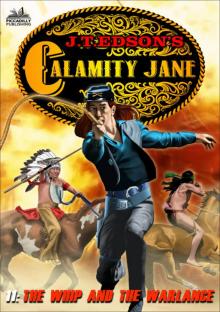 Calamity Jane 11
Calamity Jane 11 The Floating Outift 33
The Floating Outift 33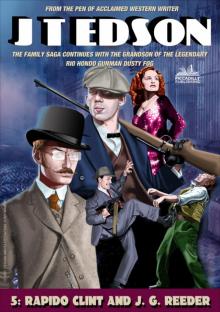 Cap Fog 5
Cap Fog 5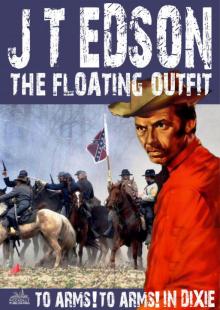 The Floating Outfit 34
The Floating Outfit 34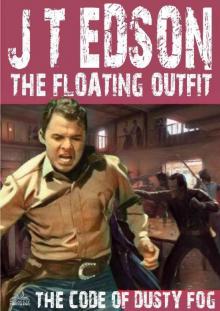 The Code of Dusty Fog
The Code of Dusty Fog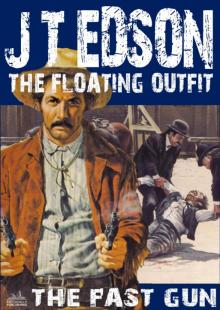 The Floating Outfit 21
The Floating Outfit 21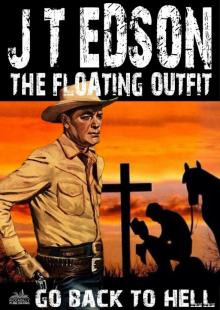 The Floating Outift 36
The Floating Outift 36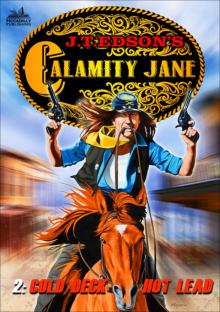 Calamity Jane 2
Calamity Jane 2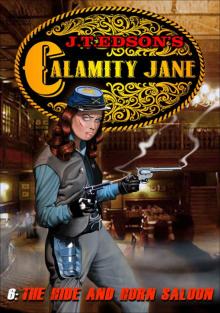 Calamity Jane 6: The Hide and Horn Saloon (A Calamity Jane Western)
Calamity Jane 6: The Hide and Horn Saloon (A Calamity Jane Western) Waco 7
Waco 7 The Floating Outfit 25
The Floating Outfit 25 Waco 7: Hound Dog Man (A Waco Western)
Waco 7: Hound Dog Man (A Waco Western) The Floating Outfit 47
The Floating Outfit 47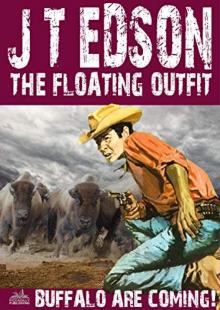 The Floating Outfit 42: Buffalo Are Coming!
The Floating Outfit 42: Buffalo Are Coming! The Floating Outfit 46
The Floating Outfit 46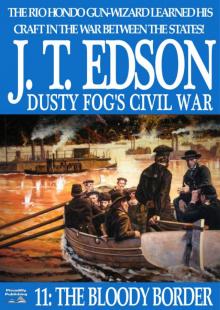 Dusty Fog's Civil War 11
Dusty Fog's Civil War 11 The Floating Outfit 61
The Floating Outfit 61 The Owlhoot
The Owlhoot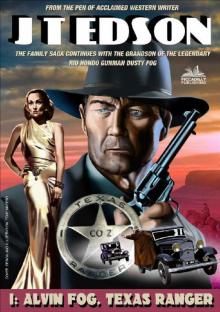 Alvin Fog, Texas Ranger
Alvin Fog, Texas Ranger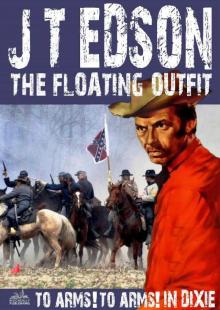 The Floating Outfit 34: To Arms! To Arms! In Dixie! (A Floating Outfit Western)
The Floating Outfit 34: To Arms! To Arms! In Dixie! (A Floating Outfit Western) The Floating Outfit 44
The Floating Outfit 44 Dusty Fog's Civil War 10
Dusty Fog's Civil War 10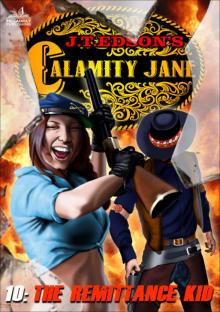 Calamity Jane 10
Calamity Jane 10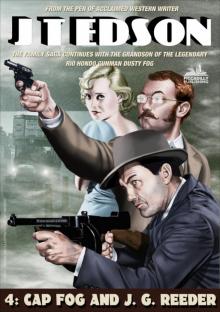 Cap Fog 4
Cap Fog 4 The Floating Outfit 51
The Floating Outfit 51 The Floating Outfit 50
The Floating Outfit 50 The Floating Outfit 49
The Floating Outfit 49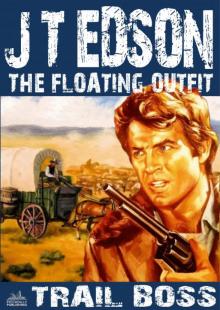 The Floating Outfit 10
The Floating Outfit 10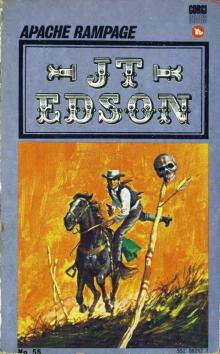 Apache Rampage
Apache Rampage The Floating Outfit 15
The Floating Outfit 15 Ranch War
Ranch War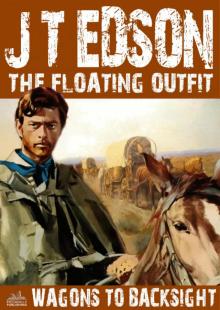 The Floating Outfit 11
The Floating Outfit 11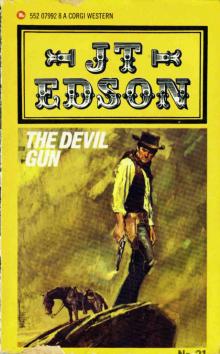 The Devil Gun
The Devil Gun Sacrifice for the Quagga God (A Bunduki Jungle Adventure Book 3)
Sacrifice for the Quagga God (A Bunduki Jungle Adventure Book 3) Comanche (A J.T. Edson Western Book 1)
Comanche (A J.T. Edson Western Book 1) The Floating Outfit 48
The Floating Outfit 48 Wacos Debt
Wacos Debt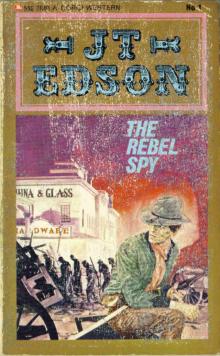 The Rebel Spy
The Rebel Spy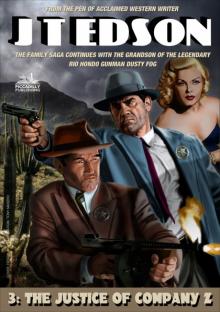 Cap Fog 3
Cap Fog 3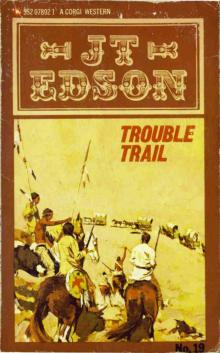 Trouble Trail
Trouble Trail Cold Deck, Hot Lead
Cold Deck, Hot Lead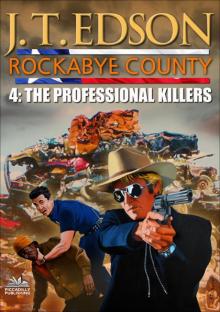 Rockabye County 4
Rockabye County 4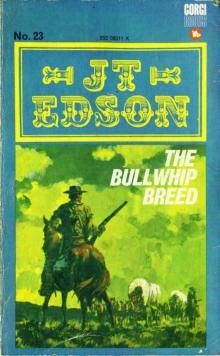 The Bullwhip Breed
The Bullwhip Breed Set Texas Back On Her Feet (A Floating Outfit Western Book 6)
Set Texas Back On Her Feet (A Floating Outfit Western Book 6) The Floating Outfit 25: The Trouble Busters (A Floating Outfit Western)
The Floating Outfit 25: The Trouble Busters (A Floating Outfit Western) Fearless Master of the Jungle (A Bunduki Jungle Adventure
Fearless Master of the Jungle (A Bunduki Jungle Adventure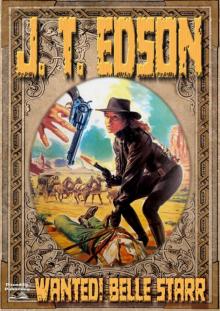 Wanted! Belle Starr!
Wanted! Belle Starr! The Big Hunt
The Big Hunt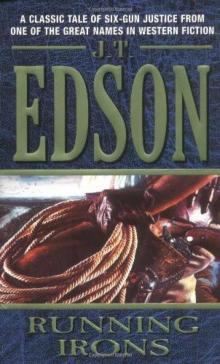 Running Irons
Running Irons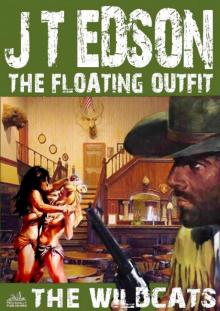 The Floating Outfit 19
The Floating Outfit 19 You're in Command Now, Mr Fog
You're in Command Now, Mr Fog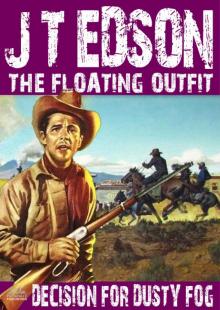 The Floating Outfit 27
The Floating Outfit 27 Texas Killers
Texas Killers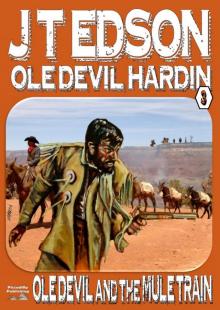 Ole Devil and the Mule Train (An Ole Devil Western Book 3)
Ole Devil and the Mule Train (An Ole Devil Western Book 3) Bunduki and Dawn (A Bunduki Jungle Adventure Book 2)
Bunduki and Dawn (A Bunduki Jungle Adventure Book 2)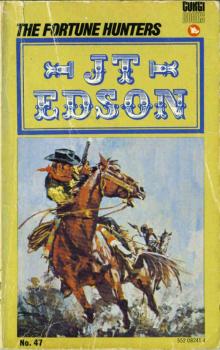 The Fortune Hunters
The Fortune Hunters The Floating Outfit 12
The Floating Outfit 12 The Hide and Tallow Men (A Floating Outfit Western. Book 7)
The Hide and Tallow Men (A Floating Outfit Western. Book 7)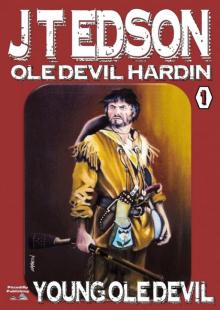 Young Ole Devil
Young Ole Devil Slip Gun
Slip Gun The Drifter
The Drifter The Floating Outfit 45
The Floating Outfit 45 Sidewinder
Sidewinder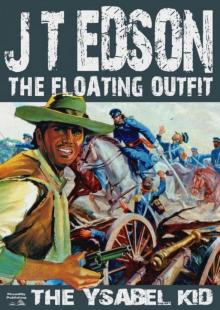 The Ysabel Kid
The Ysabel Kid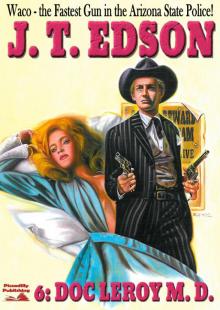 Waco 6
Waco 6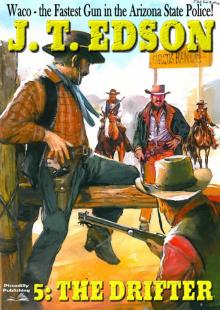 Waco 5
Waco 5 Point of Contact
Point of Contact Under the Stars and Bars (A Dusty Fog Civil War Western Book 4)
Under the Stars and Bars (A Dusty Fog Civil War Western Book 4)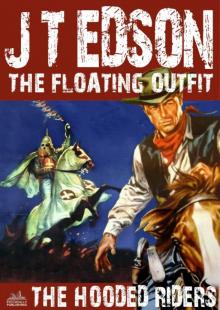 The Floating Outfit 9
The Floating Outfit 9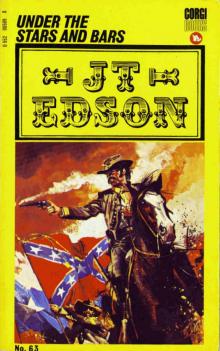 Under the Stars and Bars
Under the Stars and Bars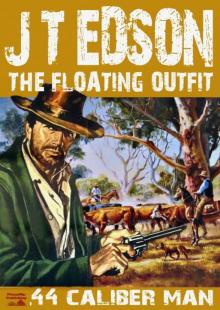 .44 Caliber Man
.44 Caliber Man The Floating Outfit 17
The Floating Outfit 17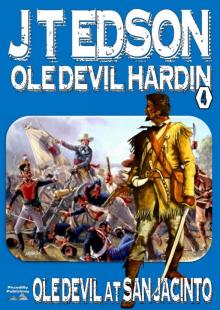 Ole Devil at San Jacinto (Old Devil Hardin Western Book 4)
Ole Devil at San Jacinto (Old Devil Hardin Western Book 4)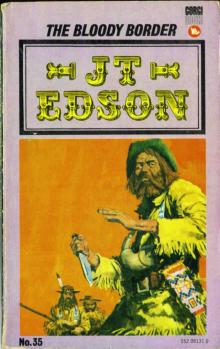 The Bloody Border
The Bloody Border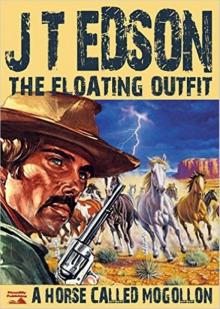 A Horse Called Mogollon (Floating Outfit Book 3)
A Horse Called Mogollon (Floating Outfit Book 3) Waco 3
Waco 3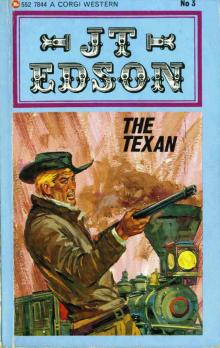 The Texan
The Texan The Floating Outfit 35
The Floating Outfit 35 Mississippi Raider
Mississippi Raider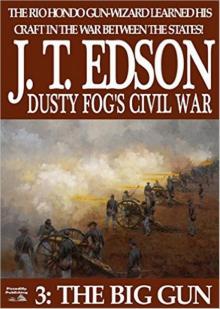 The Big Gun (Dusty Fog's Civil War Book 3)
The Big Gun (Dusty Fog's Civil War Book 3)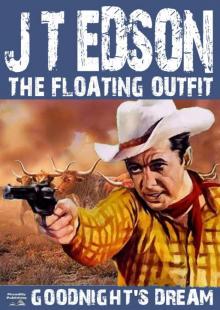 Goodnight's Dream (A Floating Outfit Western Book 4)
Goodnight's Dream (A Floating Outfit Western Book 4) Waco 4
Waco 4 From Hide and Horn (A Floating Outfit Book Number 5)
From Hide and Horn (A Floating Outfit Book Number 5) The Floating Outfit 18
The Floating Outfit 18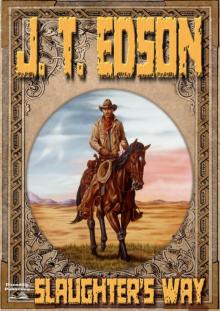 Slaughter's Way (A J.T. Edson Western)
Slaughter's Way (A J.T. Edson Western) Dusty Fog's Civil War 7
Dusty Fog's Civil War 7 Two Miles to the Border (A J.T. Edson Western)
Two Miles to the Border (A J.T. Edson Western)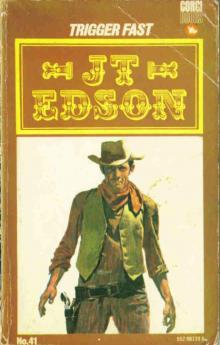 Trigger Fast
Trigger Fast Waco's Badge
Waco's Badge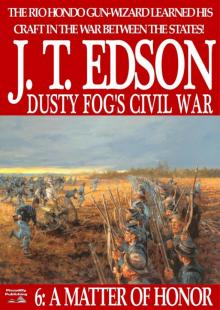 A Matter of Honor (Dusty Fog Civil War Book 6)
A Matter of Honor (Dusty Fog Civil War Book 6)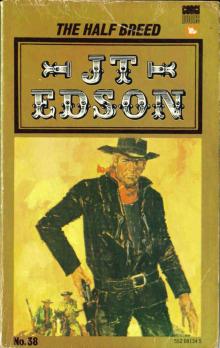 The Half Breed
The Half Breed Bunduki (Bunduki Series Book One)
Bunduki (Bunduki Series Book One)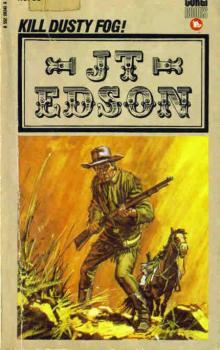 Kill Dusty Fog
Kill Dusty Fog Get Urrea! (An Ole Devil Hardin Western Book 5)
Get Urrea! (An Ole Devil Hardin Western Book 5)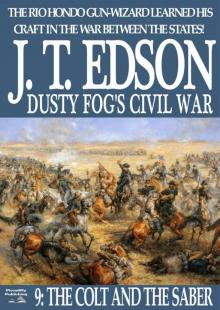 Dusty Fog's Civil War 9
Dusty Fog's Civil War 9 The Fastest Gun in Texas (A Dusty Fog Civil War Book 5)
The Fastest Gun in Texas (A Dusty Fog Civil War Book 5)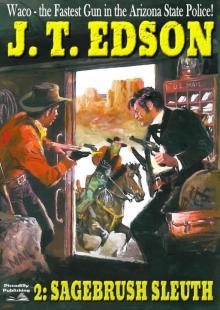 Sagebrush Sleuth (A Waco Western #2)
Sagebrush Sleuth (A Waco Western #2)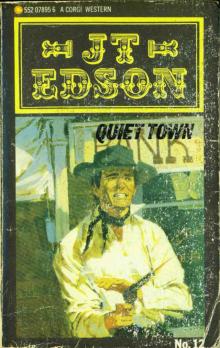 Quiet Town
Quiet Town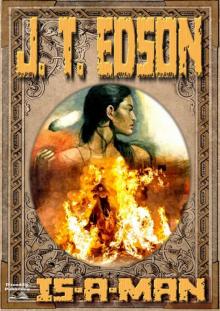 Is-A-Man (A J.T. Edson Standalone Western)
Is-A-Man (A J.T. Edson Standalone Western) Rockabye County 5
Rockabye County 5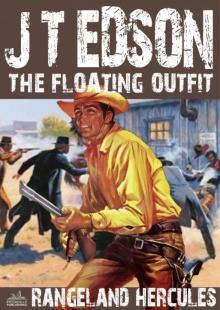 The Floating Outfit 14
The Floating Outfit 14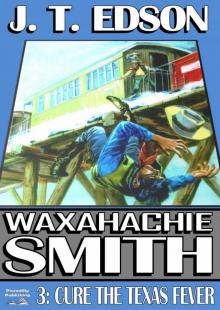 Cure the Texas Fever (A Waxahachie Smith Western--Book 3)
Cure the Texas Fever (A Waxahachie Smith Western--Book 3) The Floating Outfit 13
The Floating Outfit 13 The Road to Ratchet Creek
The Road to Ratchet Creek